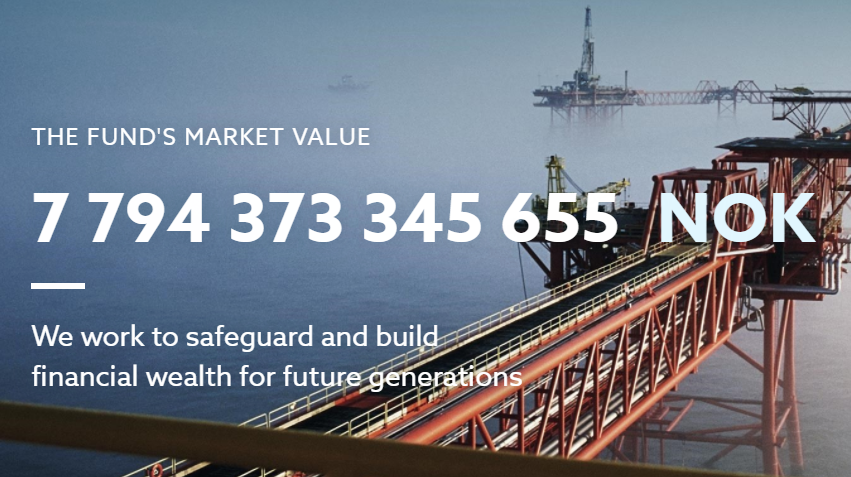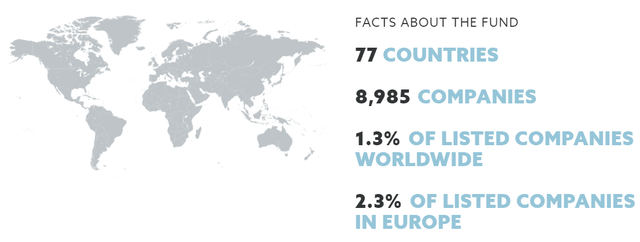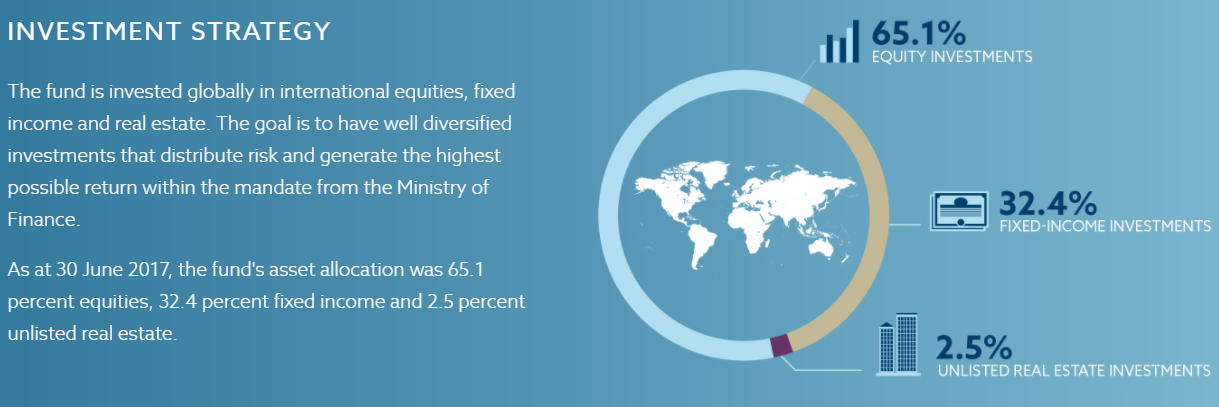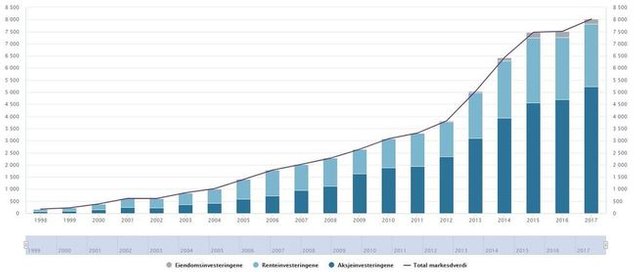Norway's sovereign wealth fund pass 1 trillion US Dollars for the first time

Screen-cap of the fund's value from the Bank of Norway's website detailing the fund. The current value can be seen live during any weekday here
Not a space-related post for a change, but as my bio does read "Norwegian Economist working at the European Space Agency", it is perhaps time to pay some attention to the two first words as well!
Some of you know it well already, but my home country Norway owns the world’s largest sovereign wealth fund. Quite impressive considering Norway's population of just around 5¼ million people. Last night, the fund set a new record passing a total value of 1000 billion US Dollars for the first time. To put its value into perspective, that is almost 200 000$ pr citizen or 1.5 million in the national currency NOK. So while a certain country is breaking new trillion dollar records in debt, it’s nice to reach a new trillion dollar record in the other direction!
Anyways, I thought this was a rather good opportunity to take on my economist-cap and explain the fund’s purpose, investment portfolio, and actual use.
What is the Sovereign Wealth Fund?
In short, the fund is Norway’s savings account from its oil and gas activities that have made it quite rich over the past few decades. Indeed, the fund is often referred to as the "oil fund" due to its value stemming mostly from the country's oil and gas industry. Its purpose is to safeguard the values derived from the oil era to also benefit coming generations. For that reason, it is also frequently called the "government’s pension fund".
The fund was founded based on the idea that the wealth found on the Norwegian continental shelf belongs not to the private entities who extract it but to all Norwegians. Not just Norwegians living today, but to all future generations. Think of it as an attempt to live up to the idea that one should do their best to leave the world a better place than the one we found for the next generation to inherit. Extracting a finite resource and spending its value by definition leaves those who come after with less opportunity as they find a country with fewer resources to use and profit from. (note that this is based on the assumption that oil and gas will still be as valuable to inherit in the future. An assumption that I doubt will stay true for very long. But that’s another post entirely). To compensate for what is taken out of the ground, the fund they inherit shall be at least as valuable as the value of the tax revenues generated from oil and gas activities on the Norwegian continental shelf adjusted for inflation. Therefore, the wealth is not to be spent by this generation of Norwegian citizens but instead saved in the fund. This is a significantly different philosophy than what you will see in any other countries that got wealthy from their national oil industry.
For the country’s money to be saved though, 100% needs to be stored or invested abroad, as it is impossible for any country to save money domestically. It is the job of the Bank of Norway, in which there is a dedicated branch working with the fund, to build an optimal portfolio and to manage it carefully.

The fund is highly international as can be seen in this overview
image source

The portfolio consists mostly of stocks, followed by bonds. In recent years, the fund has increased its portion in real-estate, buying valuable buildings in London, New York and Paris, among others
image source
So far, it’s safe to say that they have done a good job, as the fund has seen a 5.9% annual return since it was started in 1990. When accounting both for inflation and the costs of operating the fund, the average annual return is still about 4%. Together with the high taxation on oil and gas in Norway, this has allowed the state to save a lot more than it spends most years, resulting in the steep increase of the fund's value from 47 billion NOK in 1996, to about 8000 billion NOK today.

The value of the fund measured in NOK. Dark blue = stocks, light blue = bonds, and grey = real estate
image source
The budgetary rule and how the funds’ money is being used
So, does that mean that the current generation get nothing out of the country’s oil wealth?!? No. If you read it carefully, you noticed that I stated that the future generations shall inherit the value of the revenues that were generated after inflation. But that still leaves 4% of annual gains to be used.
Since 2001, all major political parties in Norway, from left to right, have been in agreement on a best practice for how to make use of the funds’ interest, a policy commonly referred to as “the budgetary rule”. In short, it states that the government may not take on a yearly deficit greater than 3% of the wealth fund’s current value. Or stated in reverse: The government may use most of the funds’ interest to finance additional spending beyond its natural income.
With a current value of 1000 billion dollars, this means that every year, the government has an extra 30 billion to spend. To a large extent, this is what allows Norway to run such an ambitious welfare state. It is very common for people in Norway to ask “why don’t we use the money in the fund to pay for schools, hospitals, science, and infrastructure?” The truth is, we are. The annual returns from the fund allow for increased spending in all of the above, and for many years to come.
This sure is a large topic for debate in Norway, and it is bound to receive more attention as the country's oil revenues is set to decrease in coming years.
Found this interesting?
You can see the current value of the fund live here.
You can see a global ranking of sovereign wealth funds in the world here
Nice post! I have mixed feeling about this fund. I think the generous welfare state increases spendings on guess what, welfare, and you also see decrease in participation rate in the work force. Also, you get a lot of immigrant that will extract much more resources than they bring in. A lot of money also decrease competitiveness in my opinion. Scarcity breeds innovation and disruptive capitalism. Perhaps, the Sovereign Wealth Fund should consider investing some money in blockchain technology, as a option like (barbell) strategy.
Thank you for your comment @janusface and sorry for a somewhat late reply.
I'm totally with you as regards to the side effects of too much welfare, how it can make people lazy and less innovative or how providing a total safety net seems to unlearn personal responsibility.
It's sad to see in much of my own generation, that rather than young people thinking "lucky me, I was born in Norway so I can aspire to be anything!" too many seem to think "lucky me, I was born in Norway so I don't really have to do anything". Life without a sense of urgency is indeed a killer of creativity, innovation, entrepreneurship and productivity.
But I'm not sure I would agree that this is an argument against the structure of the oil fund. To the contrary, I think one could say the opposite. Countries that do not save the money but instead spend it on its citizens instantly, seem to fall into the welfare trap even harder. And it is not necessarily a "Public versus Private" question either. Looking at people who got rich from their own businesses supplying services to the oil and gas sector in my home-city of Stavanger, you see a lot of the same "we don't need to work, we already own the world" mentality in a lot of people from upper-middle-class families that own their own businesses.
In any case, Norway has gone very well through years of global economic uncertainty, much thanks to the fund. Now I do have many ideas for how it could be handled or allocated better, but overall I think it's been done pretty well. At least when you consider how no nations of Norway's size have ever been in this type of situation ever before. We're a first in trying this out, and nothing is perfect on the first attempt :)
Really good and informative post! Thanks!
I work in the oil industry and this was very interesting!
Just had to resteem this because a lot of people need to know where all their welfare comes from! Seems like a lot of Norwegians these days forget why we have such a good life here!
Hello @hamlander and thank you both for the comment and the resteem!
Indeed this is not to be taken for granted and a lot of people these days seem to want to talk about change without knowing anything at all about the consequences of the change they demand.
I totally agree! They don't know how and why they have it as good as they do! Especially in the large cities!
If political leaders had more wisdom, every country would have a sovereign wealth fund. You don't need oil to do this. For that matter, every individual should have an investment fund. I do. A lot of it is invested in Steem Power.
I agree everyone should have an investment fund and co-own the ventures they themselves help create. That is the beauty of the Proof of Stake model and with STEEM, we all have a stake in seeing the overall project succeed and will all benefit if it takes off.
Countries should indeed acknowledge how the small work of every inhabitant to promote wellbeing of the country's citizens are co-owners of the country's own wealth.
Great post! Makes me a bit envious (in a good way) of the Norwegians for having
a government whom has their people best interest. Thank for sharing.
Best wishes, @splendorhub
Thank you for your comment @splendorhub
Yes I think it is a reason to be proud of one's country. As little as I care about nationalities, it sets an example of how one can handle wealth accumulation and make the priorities with it that takes everyone into mind to the extent possible.
Terrific post. Love İt. @fredrikaa
Although I lack English but I will translate the writing, very interesting information friend. thank you @fredrikaa.
Those are really the great numbers. Norway owns the world’s largest sovereign wealth fund, I really did not know it.
I did not knew anything about such a sovereign fund that Norway had started. Great to know about it. I don't know if many in India know about it. Its a good article, has enhanced my knowledge. As a new member, I am happy to know this fact, would love to read more of your articles.
This post recieved an upvote & comment from mahbubalam. If you would like to recieve upvotes comment from mahbubalam on all your posts, simply FOLLOW @mahbubalam